Quartz countertops have become a popular choice in modern kitchens due to their durability, elegance, and low maintenance. However, despite their robust nature, quartz countertops are not invincible. Over time, they can suffer from various forms of damage, such as chips, cracks, stains, and scratches. Understanding how to repair these issues is crucial for maintaining the beauty and functionality of your quartz countertops. I’ve found that addressing these problems early can prevent more extensive damage and help preserve the countertop’s appearance for years to come.
When dealing with chips in a quartz countertop, it’s essential to assess the size and location of the damage. Small chips, particularly those on the edges, are common and can often be repaired at home with a specialized repair kit. These kits typically include a clear or color-matched epoxy resin, which you can apply to the chip, filling it in and creating a smooth, seamless surface. I recommend using fine-grit sandpaper to gently buff the area once the resin has dried. This helps blend the repair with the surrounding quartz, making it less noticeable. Larger chips or those in highly visible areas may require professional repair to ensure a perfect match with the rest of the countertop.
Cracks in quartz countertops are a more serious issue and can be caused by sudden impacts, heavy objects, or even thermal shock—where the countertop is exposed to extreme temperature changes. While minor cracks can sometimes be filled with epoxy resin, larger or deeper cracks often require professional attention. I’ve seen cases where attempting a DIY repair on a significant crack resulted in further damage or an unsightly repair job. Professionals have the tools and experience needed to ensure the crack is properly filled and reinforced, preventing it from spreading further.
Stains are another concern with quartz countertops, although they are less porous than natural stones like granite or marble. Quartz is highly resistant to staining, but certain substances, such as wine, coffee, or oil, can leave marks if not cleaned up promptly. When dealing with stains, I’ve found that mild detergent and warm water are often sufficient for most spills. However, for more stubborn stains, a non-abrasive cleaner or a specially formulated quartz cleaner is recommended. It’s important to avoid harsh chemicals or abrasive scrubbing pads, as these can damage the quartz surface.
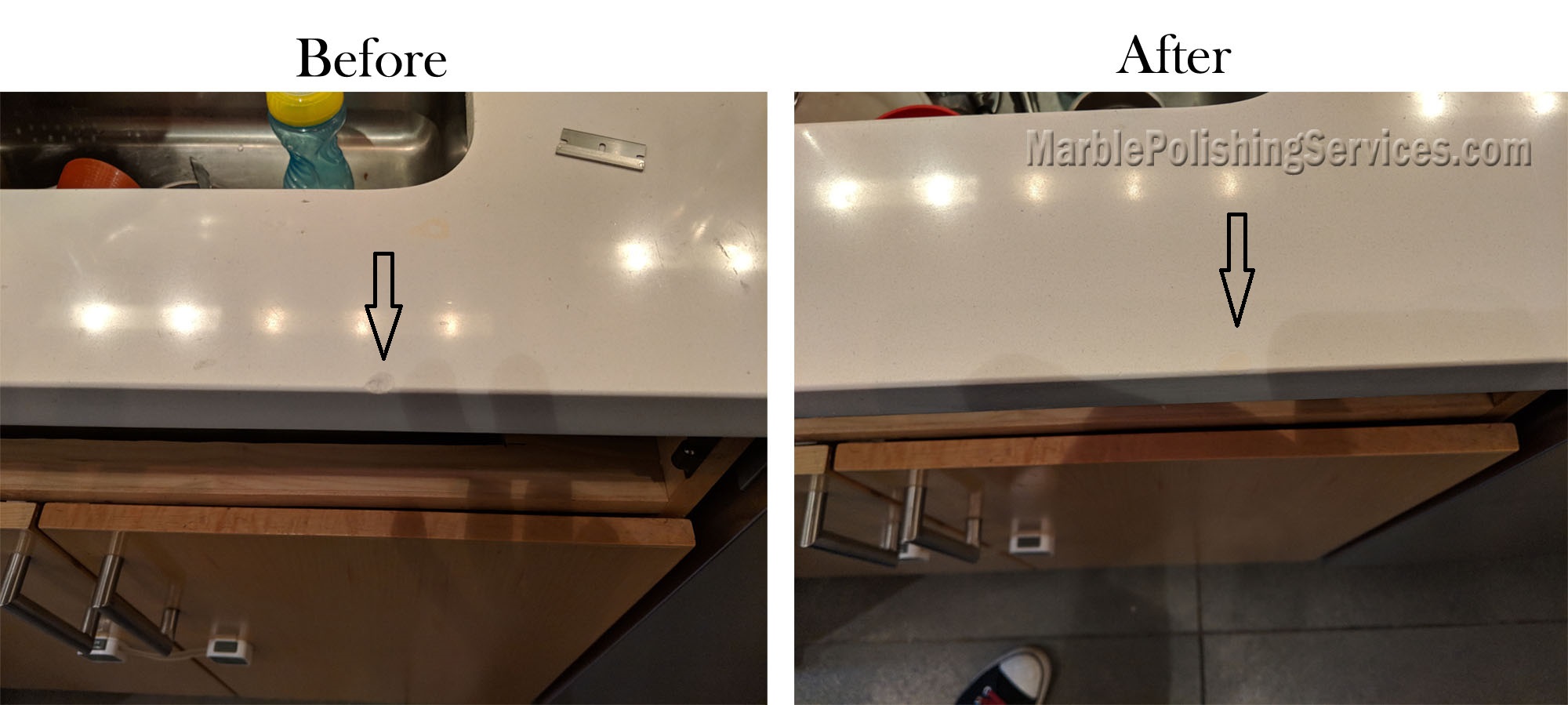
Scratches are relatively rare on quartz countertops due to their hardness, but they can occur, especially in high-traffic areas or if the countertop is used as a cutting surface. Small scratches can sometimes be buffed out using a polishing compound and a soft cloth. I’ve had success with this method in reducing the appearance of light scratches, but deeper scratches may require professional refinishing. It’s always a good idea to use cutting boards and avoid dragging heavy objects across the countertop to prevent scratches in the first place.
One of the challenges with quartz countertop repair is matching the color and pattern of the existing countertop. Quartz is an engineered stone, made by combining natural quartz with resins and pigments, which means each countertop can have a unique appearance. When repairing chips or cracks, it’s important to use a color-matched resin or epoxy to ensure the repair blends in with the surrounding area. I’ve found that working with a professional who has access to a wide range of color options can make a significant difference in achieving a seamless repair.
In some cases, quartz countertops may require more extensive repairs or even replacement of a section. This can happen if the countertop has sustained significant damage, such as a large crack that compromises the integrity of the surface. Replacing a section of quartz countertop is a complex process that involves cutting and matching the new piece to the existing countertop. I’ve seen cases where this was necessary, and while it can be costly, it’s sometimes the only way to restore the countertop to its original condition.

Preventative maintenance is key to minimizing the need for repairs on quartz countertops. I always recommend using trivets or hot pads when placing hot pots and pans on the countertop to prevent thermal shock, which can cause cracks. It’s also important to wipe up spills promptly to avoid staining and to avoid using harsh chemicals that can damage the surface. Regular cleaning with a mild detergent and a soft cloth is usually all that’s needed to keep quartz countertops looking their best.
Another aspect to consider is the potential for edge damage. The edges of quartz countertops are particularly vulnerable to chips and cracks, especially in areas with high traffic or heavy use. I’ve found that using edge protectors or being mindful of how objects are handled around the edges can help prevent this type of damage. If an edge does become chipped or cracked, it’s usually a relatively straightforward repair using epoxy resin, but catching the damage early is key to a successful repair.
While quartz countertops are highly durable, they can still suffer from wear and tear over time. I’ve noticed that, in some cases, the surface may become dull or lose its shine, especially in areas that see a lot of use. This can often be addressed with a professional polishing service, which can restore the countertop’s original luster. Regular polishing isn’t necessary for most quartz countertops, but if you notice the surface becoming dull, it’s a good option to consider.
It’s also important to be aware of the limitations of quartz countertop repairs. While many issues can be addressed with DIY methods or professional services, there are some situations where the damage may be too severe to repair effectively. For example, if a large section of the countertop is cracked or broken, it may be more practical to replace the entire countertop rather than attempt a repair. I’ve seen cases where attempting to repair extensive damage ended up being more costly and time-consuming than simply replacing the countertop.

One common mistake I’ve seen is using inappropriate products or methods for cleaning and repairing quartz countertops. Harsh chemicals, abrasive pads, and improper techniques can all cause damage to the surface, making repairs more difficult. It’s essential to use products that are specifically designed for quartz countertops and to follow the manufacturer’s recommendations for cleaning and maintenance. This not only helps prevent damage but also ensures that any repairs you do make will be more effective.
In some cases, quartz countertops may develop what’s known as “etching,” which is a dull spot that occurs when the surface comes into contact with acidic substances. While etching is more common with natural stones like marble, it can also happen with quartz if the surface is not properly protected. I’ve found that using coasters, placemats, and other protective measures can help prevent etching, but if it does occur, it’s usually a good idea to consult with a professional to determine the best course of action.
Finally, one of the most important aspects of quartz countertop repair is knowing when to seek professional help. While there are many DIY repair options available, some issues are best left to the experts. I’ve found that professionals have access to specialized tools and materials that can make a significant difference in the quality of the repair. Whether it’s a large crack, a deep scratch, or a complicated color match, a professional repair can often provide a more durable and aesthetically pleasing result.

Common Mistakes to Avoid
Using Harsh Chemicals: One of the most common mistakes I’ve seen is using harsh chemicals or abrasive cleaners on quartz countertops. These can damage the surface and make future repairs more difficult. Always opt for gentle, non-abrasive cleaners that are specifically designed for quartz.
Ignoring Small Chips or Cracks: Small chips or cracks may seem minor, but I’ve found that ignoring them can lead to more significant damage over time. It’s important to address these issues early to prevent them from worsening.
Attempting Complex Repairs Yourself: While DIY repairs can be effective for minor issues, more complex repairs, such as large cracks or color matching, are best left to professionals. I’ve seen cases where DIY attempts led to further damage or unsightly results.
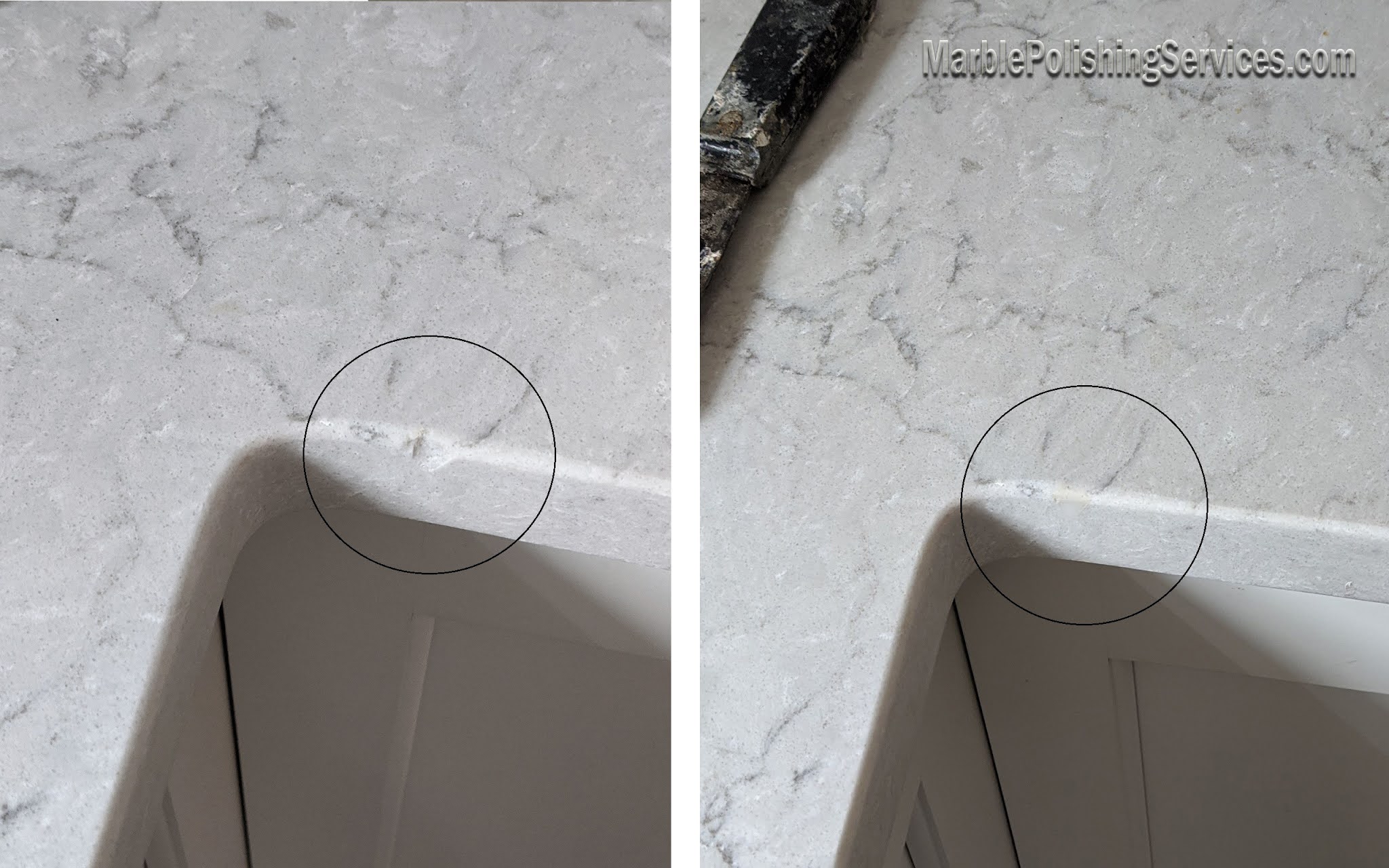
Not Protecting the Countertop from Heat: Quartz countertops are durable, but they’re not immune to thermal shock. Placing hot pots and pans directly on the countertop can cause cracks. I always recommend using trivets or hot pads to protect the surface.
Using the Countertop as a Cutting Surface: Cutting directly on a quartz countertop can lead to scratches and dull the surface. It’s always best to use a cutting board to prevent damage and keep the countertop looking its best.
Overlooking Regular Maintenance: Regular maintenance is key to preventing damage and prolonging the life of your quartz countertop. I’ve found that simple habits like wiping up spills promptly and using coasters can make a big difference in keeping the countertop in top condition.

How can I repair a small chip in my quartz countertop?
Small chips can often be repaired using a clear or color-matched epoxy resin. I recommend cleaning the area thoroughly before applying the resin and allowing it to dry completely. Afterward, you can gently sand the area with fine-grit sandpaper to smooth it out. For a more seamless repair, consider hiring a professional, especially if the chip is in a highly visible area.
What should I do if my quartz countertop develops a crack?
Cracks in quartz countertops can vary in severity. For minor cracks, you may be able to fill them with an epoxy resin, but larger cracks usually require professional attention. I’ve found that professionals can reinforce the crack to prevent it from spreading and match the repair to the existing countertop color and pattern more effectively.
Can quartz countertops stain, and how can I remove a stain if it occurs?
Quartz countertops are resistant to stains, but they’re not completely stain-proof. If a stain does occur, I suggest using a non-abrasive cleaner or a specially formulated quartz cleaner. It’s important to avoid harsh chemicals, as these can damage the surface. Regular cleaning and wiping up spills promptly can prevent most stains.
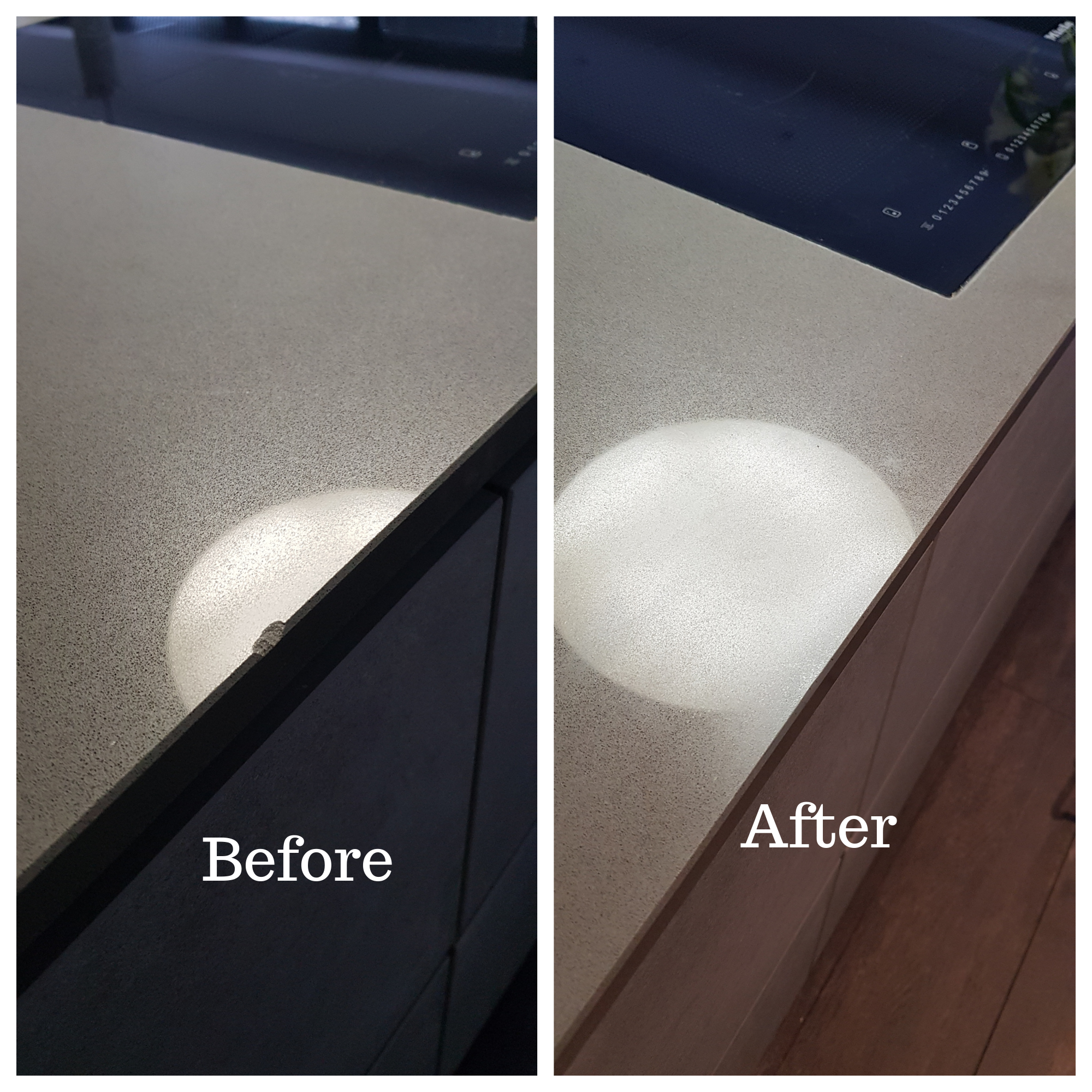
How do I prevent scratches on my quartz countertop?
To prevent scratches, I always recommend using cutting boards and avoiding dragging heavy objects across the countertop. While quartz is resistant to scratches, it’s not completely scratch-proof. If a scratch does occur, minor ones can sometimes be buffed out with a polishing compound, but deeper scratches may require professional repair.
Is it possible to repair a dull spot on a quartz countertop?
Dull spots, often caused by etching or abrasion, can sometimes be restored with a professional polishing service. I’ve found that regular maintenance and using the right cleaning products can help prevent dull spots, but if they do occur, a professional can usually restore the countertop’s shine.
Should I hire a professional to repair my quartz countertop, or can I do it myself?
While some minor repairs can be done yourself, I usually recommend hiring a professional for more complex issues like large cracks, deep scratches, or significant chips. Professionals have the tools and experience to ensure a high-quality repair that matches the existing countertop, which can be challenging to achieve with DIY methods.
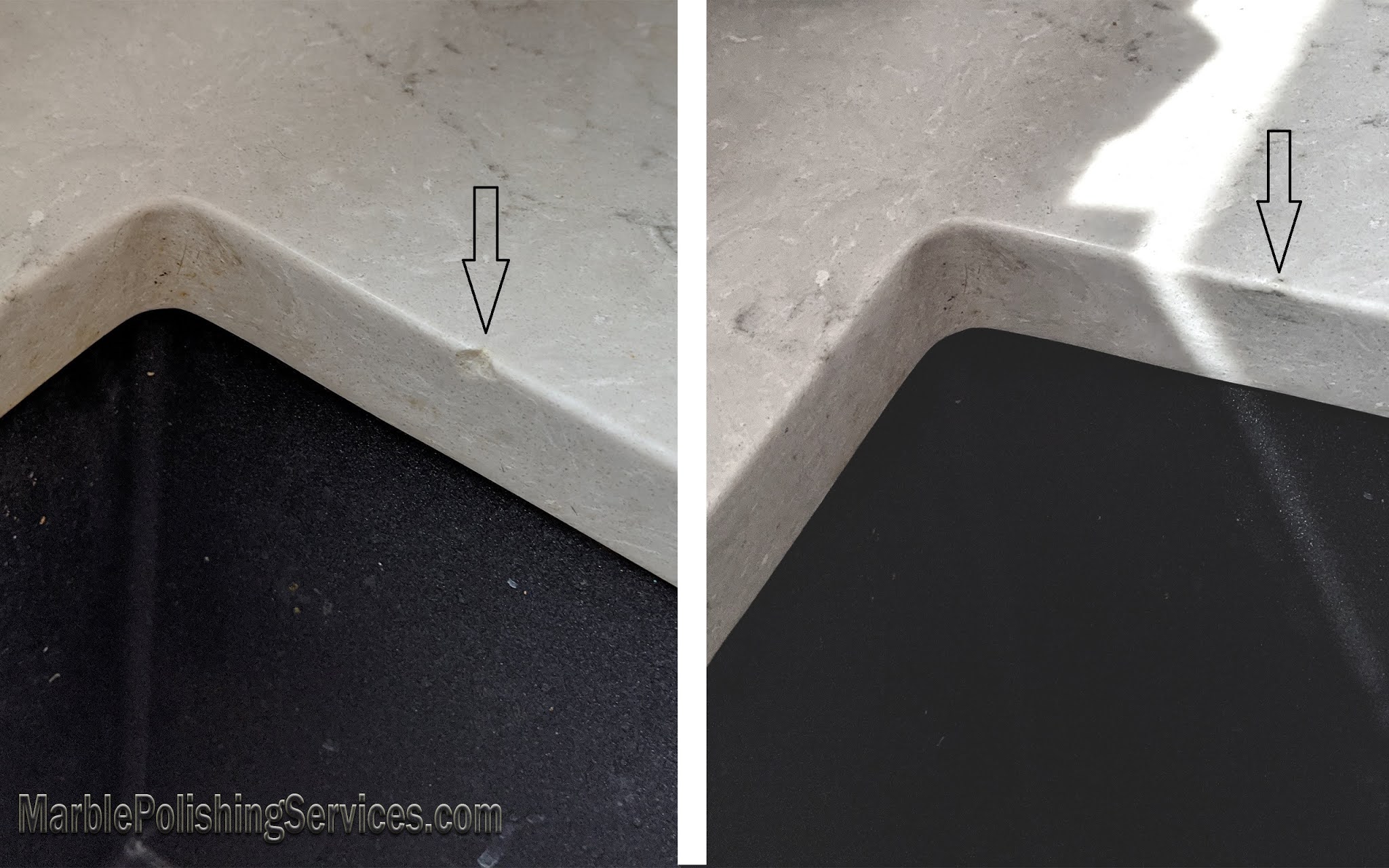
Chip in quartz countertop
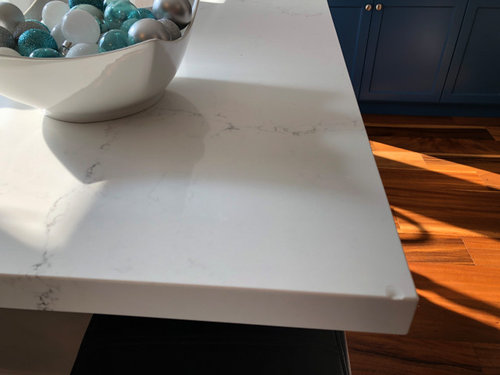
Related articles: